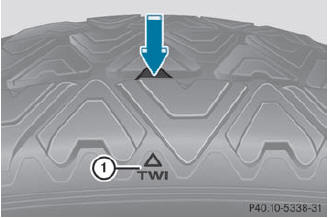Tire tread
WARNING
Although the applicable federal motor vehicle
safety laws consider a tire to be worn when
the tread wear indicators (TWI) become
visible at approximately 1/16 in (1.6 mm), we
recommend that you do not allow your tires
to wear down to that level. As tread depth
approaches 1/8 in (3 mm), the adhesion
properties on a wet road are sharply reduced.
Depending upon the weather and/or road
surface (conditions), the tire traction varies
widely.
Do not use tires that are excessively worn as the tire traction on wet road surfaces decreases significantly when the tread depth is less than 1/8 inch (3 mm).
Tread wear indicators (TWI) are required by law. Six indicators are positioned on the tire tread. They become visible as soon as a tread depth of approximately 1/16 inch (1.6 mm) has been reached. If this is the case, the tire is so worn that it must be replaced.
The recommended tread depth for summer tires is at least 1/8 inch (3 mm). The recommended tread depth for winter tires is at least 1/6 inch (4 mm).

Bar marking 1 for tread wear is integrated into the tire tread.
See also:
Folding the exterior mirrors in or out electrically
Make sure that the SmartKey is in position
1 or 2 in the ignition lock.
Briefly press button 1.
Both exterior mirrors fold in or out.
Make sure that the exterior mirrors are
always fol ...
Displaying program information
This function is only available for analog FM
and digital AM/FM programs (HD Radio).
Information relevant to the current station is
shown in the display window.
Select Info in the radio display ...
HOLD function
General notes
The HOLD function can assist the driver in the
following situations:
Х when pulling away, especially on steep
slopes
Х when maneuvering on steep slopes
Х when waiting in tr ...
